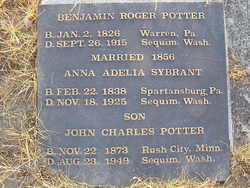
(Thanks to FindAGrave.com for this image; Sequim View Cemetery)
An obituary from The Olympic Leader, dated 26 September 1915:
Benjamin R. Potter, Pioneer Resident Dead
Benjamin R. Potter, one of the oldest men in Clallam County and a resident of the Sequim community since 1886, died at his home here of old age on Sunday, September 26th. He was close to 90 years.
He was born in Crawford County, Pennsylvania, January 2 1826 and was married to Adelia Sybrant of Sparta Township, Pennsylvania, August 28 1855. His wife survives him.
In 1865 they moved to Minnesota and took up a homestead near Rush City where they resided 21 years coming further west to Washington Territory in 1886 and settling at Sequim where they have ever since made their home.
Here in 1905 they celebrated their golden wedding surrounded by their children and grand children, a very interesting and memorable occasion for the entire assemblage.
Ten years have since been added to their married life making the unusual record of sixty years together.
Born to this union were ten children, nine of whom are living, as follows: Mrs. J.W. Grant, Seattle; Mrs. Effie Pilcher, Sequim; Mrs. J.L Pownall, Eugene, Oregon; G.E. Potter, Sequim; Mrs. William Wooding, Reeveton; J.C. Potter, Mabton; Mrs. C.L. McDougal and Mrs. Eva Ware, Sequim, and W.B. Potter, Puyallup.
There are 38 grandchildren and 28 great grandchildren. One sister, Mrs. Cynthia Sybrant of Harris, Minnesota, survives the deceased.
The funeral took place from Mrs. Ware's residence where Mr. and Mrs. B.R. Potter have been making their home. Services were conducted by Rev. C.E. Fulmer of Port Angeles and burial took place in the Sequim Vew Cemetery.
Mr. Potter was a farmer by occupation most of his life. He was a member of the Baptist Church and a highly respected, honorable and industrious citizen throughout his long and useful career.